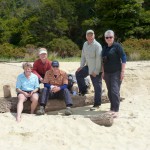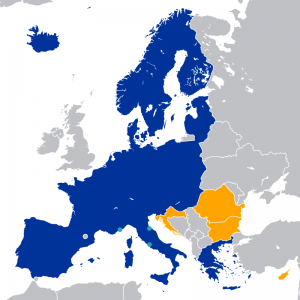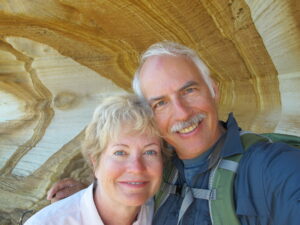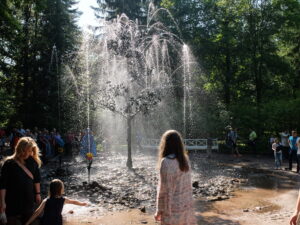
Why travel? Sure, Auntie Em, there is no place like home, but the world is full of stunning natural wonders, historic human creations, and exciting cities. Like many inveterate travelers, we hope to see a lot more of these in the coming years. But the world is also full of other cultures – at times akin to ours, at times engagingly different, and at times inscrutable. That’s why meeting people on the road, for us, can be as memorable as any sight and give pleasures even longer lasting.

People who take cruises or tours are familiar with this possibility, but they tend to meet people more like themselves than citizens of the places they visit. So how do you meet locals or even travelers different from you?

We’ve been thinking back about the many friends we’ve made over the last year, in Southeast Asia and New Zealand, and how we’ve met them. Here then are twelve ways you can do the same and enrich your experience of the places you visit.
- Linger a while – The longer you stay in a place, the more time you have to dawdle at local establishments and to interact with neighbors and shopkeepers. When you spend just a few days in a place, you inevitably skitter to and from among its major tourist sights. Speed kills the possibility of relationships. Though living in a place for months works best, even a leisurely week or two can give you the chance to engage with those around you.
- Linger over food or drink – In this way, conversations can find you. In Italy, we were often saddened by the haste of many tourists to eat up and get out. Italians don’t expect you to want the check quickly; once you’re at a table, they think you’ll stay a while. In Florence, a few years ago, we were eating lunch at an outdoor restaurant before departing to visit another church. Instead we found ourselves talking for hours with a table of 5 Florentines in a mélange of English and Italian. We can’t remember the interiors of most of the incredible churches we saw that visit, but we still remember this encounter vividly.
- Avoid a table of your own; hang out either at the bar or outside – No man is an island, and no group either, until they sit at their own table, self-contained and cut-off from others. For a much better chance of conversation starters, head up to the bar where the interactions are much more fluid. Or set down at a big table where conversation is likely to find you. Better yet, head out back to join those outside where people just seem to interact more. We did this at a club in Wairoa after a quiet dinner by ourselves, then spent hours with three garrulous couples, including a town councilor and rancher who hosted us at his home the next day.
- Get away from your group –If you’re travelling with a tour group, you move in a virtual container (or actual one, the car or bus). It’s the handler’s job to steer you relentlessly from sight to sight, and past potential encounters as if they were dangerous shoals. Arranged meals – often in touristy places that offer volume food for groups – isolate you further from the populace like an infection. Even during free time, you’ll also tend to move in packs, sub-groups of the larger group. A group of only two can also seal themselves off from potential conversation by connecting mainly with each other. So let strangers in by leaving the romance for later or ditching the group, like an 80-year old Australian couple we just met fleeing the constraints of their bus tour.
- Get out of your hotel – Most hotels inhibit interaction like high-rise apartments do. So head out for a meal, or just wander in a nearby park, or find the nearest café or pub; you’re much more likely to connect with someone that way. We shared hours of conversation with a number of young travelers from various parts of Europe by diving into the $1 buffet offerings in the markets of Luang Prabang rather than the hotel restaurant where we found most of the patrons eating. All the buffet dining tables were shared, so we inevitably found a talkative and congenial group.
- Stay at backpacker hotels – Don’t go to that glitzy hotel in the first place; we don’t because we’re usually outside anyway. Bed and breakfasts give you the chance to converse with the hosts and the small number of guests. Backpacker places are even better. You can share bunk rooms, of course, but even staying in a separate bedroom we never fail to connect with interesting travelers from around the world. Most cook in the shared kitchen and eat in the common dining room as well. Many hang out in the common living rooms. There are always conversations to tie into. Most recently in Nelson, we spent several late afternoon hours discussing travel, politics and music with seven people from New Zealand, Germany, China and other countries – just hanging about like a large family gathering.
- Go off the beaten track – We’ve found that adventure trips and places off the usual tourist checklist make for good meet ups. On guided hikes, for example, or offbeat tours like the nature preserve of Kapiti Island, you can spend hours with equally adventurous people. On our languorous trip down the Mekong River in Laos, we formed an engaging quartet of couples – one Swiss, one British, one Australian and us – sharing travel experiences and stories. We’re still in touch. On Christmas Eve at a farmer’s home in Mae Cho, Vietnam, we were invited to join a small French group who had hiked there. By the end of the night, which ended hilariously with one of them toppling into a water-filled ditch, we were all good friends despite our hesitant French. Now we’re scheduled to visit them on our next visit to France. And it’s not just the tourists. The local guides, we have found, are quite open to becoming friends if you are interested. One invited us to a family wedding in Cambodia. We have become Facebook friends with two others from SE Asia, one a fine amateur photographer with whom we exchange pictures.
- Pretend you’re not among people who speak a foreign language – Not knowing the local language does limit the possibilities of conversation, but not so much as you would think. Around the world, particularly in younger people, English is the global second language. Most are happy to practice their English and bail you out of your limited grasp of their language. In addition, we’ve found an endless interest in how Americans think and why they are the way there are. You may wish you had studied more languages when younger, but take advantage of their interest in you to find out about their lives as well. In SE Asia, while we were lingering, we met many people who have relatives in America, like a restaurateur at a tiny place in Vientiane, or a couple in Canh Tho, Vietnam that scootered off to the market to purchase huge scampi for our dinner. Even among the English-speakers in New Zealand, we’ve been approached frequently by intrigued locals who detected our American accent and wanted to explore what we thought.
- Be open to viewpoints and emotions – Talkativeness, philosophizing, argumentativeness, inquisitiveness – these are typical virtues in those we meet on the road. In our experience, they appreciate the give and take of a good discussion on a hot topic, which they address passionately and with surprising knowledge. And they are most interested in hearing firsthand what we and other Americans think, whatever their opinion of America’s policies or influence. If you are willing to take part, you’ll learn a lot more about them and their culture than you’ll find in your guidebooks. Of course, as guests in their country, you want to be respectful of their culture, recognizing what might be offensive. But they don’t expect you to get it all right as a foreigner and, as hosts, they often go out of their way to respect you as well. Don’t be like the Texas couple that shunned a Kiwi we met because he dared to talk about the U.S. election, as if he had no right to. Try a bit of openness yourself.
- Play a game – We wish we could kick a soccer ball better, knew the ins and outs of bocce ball, dared to fling darts in civilized society, let alone withstand the physicality of rugby. Joining in a game, or better yet a team, is a sure fire way to meet people. The other night a Brit we made friends with joined the billiards contest next door and came back with a number of new contacts. In Napier, we dived into quiz night, a staple of Kiwi pub life. Amid nothing but locals, we may have struggled with obscure local topics, but we filled in with several conversations that lasted into the night.
- Connect via real world or online associations – Many of us are fortunate enough to be alumni of schools whose graduates are spread around the globe, or fraternal organizations like the Lions, or employees/ex-employees of international companies. There are many other associations like Chabad that offer opportunities to join with locals. In advance of a trip, contact groups like these and see what opportunities you can create during your travels. What’s more, in today’s Facebook and LinkedIn world, friends in far-off places are just a few degrees of separation away. Tell your contacts where you’re going and find out who they know at your destination. We’ve been in touch with several people in New Zealand as a result of such networking.
- Get involved and volunteer – We believe it’s important to help others, even as we travel. It also happens to be a special way of meeting local people. More and more, you can make volunteerism the crux of your travel, via church mission groups or travel organizations dedicated to “voluntourism” like Responsible Travel. Otherwise, if you linger in a place, you can start attending a local church and get involved in its community activities. To be truly useful locally, it’s best if you can provide regular assistance or dedicate sufficient time for a project. But, even in a short stay, there are many casual opportunities to give a hand if you seek them out – ushering at a theatre, working a half day on a house rehab, soliciting donations and food for the homeless, and so on. As a result of activities like these in Wellington, we’ve befriended a number of people here.

That’s our list, but we keep adding to it. In your travels, you may not be home, Auntie Em, but you can turn the places you visit more homey and more memorable. Just make a little effort to connect with the people around you.
So, what has worked for you?







We have found that our best way to connect is at mealtimes. Sitting at the outside table or at a large table. We’ve made friends by asking for help with the language–particularly in cafes. Many travellers have much better language skills than we do, and they are more than willing to help.
I especially like your idea about asking for help. That’s a very useful and engaging way to start a conversation, even for a man!
Great tips, I should staple to my passport